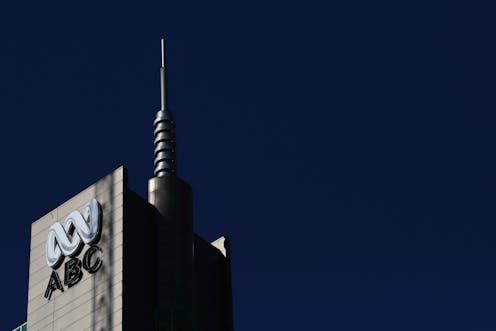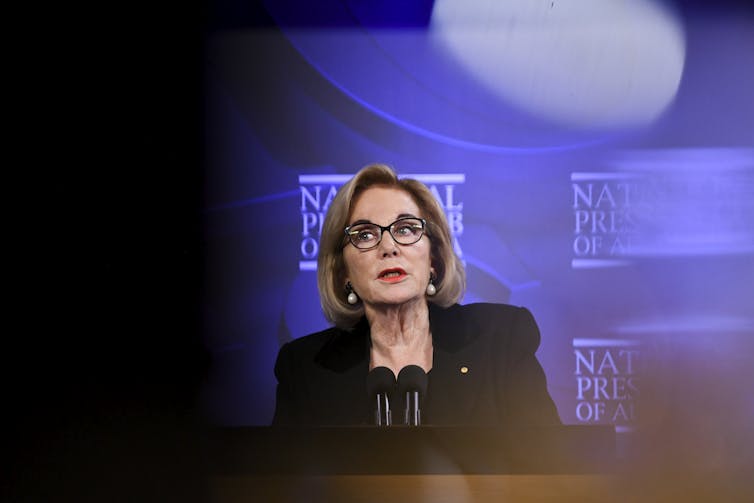Source: The Conversation (Au and NZ) – By Matthew Ricketson, Professor of Communication, Deakin University

Danny Casey/AAP
A fresh fight has broken out between the national broadcaster and the Coalition government. This time, it is over a Senate inquiry, instigated by a Liberal senator, into the way the ABC handles complaints.
ABC chair Ita Buttrose has sensationally labelled the inquiry an act of “political interference designed to intimidate the ABC and mute its role”. She is calling on the senate to block the inquiry, when parliament returns next week.
Read more:
View from The Hill: Ita isn’t saluting the captain who picked her
Prime Minister Scott Morrison dismissed the comments on Monday, arguing a parliamentary investigation is just “business as usual” and the ABC is “not above scrutiny for how they conduct themselves using taxpayers’ money”.
We have been researching ABC-government relations for our upcoming book, Who Needs the ABC? Is there more to this simple senate inquiry than meets the eye?
What will the inquiry do?
The latest stoush broke out after NSW Liberal senator Andrew Bragg announced an inquiry into the ABC’s complaints-handling process.
It has just one term of reference, which is to
examine the adequacy of the existing arrangements to provide a framework that is accessible, responsive, efficient, accountable and fit-for-purpose.
However, in October, the ABC announced its own inquiry into the complaints-handling process. It has 11 terms of reference and is an external, independent review by former Commonwealth ombudsman, John McMillan, and former news and current affairs executive for SBS and Ten, Jim Carroll.
The Senate committee is due to report by February 2022, with the McMillan/Carroll inquiry due to come back to the ABC board by March.
Complaints handling and the ABC
The ABC set up its inquiry following criticism of the way it handled complaints about editorial decisions.
This includes comments by communications minister, Paul Fletcher, who told The Australian in September:
If viewers or listeners have a concern about a program on the ABC they should have access to a robust, independent complaints process. Yet it’s clear that this is far from the universal experience of those who complain to the ABC about a program.

Sean Davey/AAP
Bragg has suggested a “litany” of people are unhappy with complaints-handling, including Jewish groups and veterans. Former editor of The Sydney Morning Herald Milton Cockburn has also complained regarding the Luna Park documentary Ghost Train.
News Corp has been particularly hostile towards the ABC after Four Corners programs in August investigated the Murdoch-owned Fox News and its conduct around the 2020 US elections.
There may be merit in some of these concerns, but there is also a dollop (or should that be a wallop) of politics and ideology.
Any system can be improved, but there is no compelling evidence the ABC’s system is broken. In any case, its board has already acted to improve it.
Anyone unhappy with the ABC’s internal process can already take their complaint to the Australian Communications and Media Authority, which is responsible for regulating broadcast media.
The ABC’s complaints-handling process was also reviewed by then director of editorial policies, Paul Chadwick, and the ABC chair, Maurice Newman, in 2009. They found the processes to be “fundamentally sound” and “transparent” when compared to other media organisations. In 2018, the Australian National Audit Office reviewed the ABC and found it “effectively manages complaints” and that its system was responsive to its audience and easy to navigate.
The ‘forever war’
This latest episode should be seen in the context of what seems like a “forever war” waged by the Coalition against the ABC. Put simply, the Coalition believes the ABC is irretrievably biased against it (and pro Labor), even though we have not been able to find a properly conducted academic study that supports their belief.
Examples range from former Prime Minister Tony Abbott breaking an election eve promise not to cut the public broadcaster’s funding, to his full-frontal attacks on ABC reporting.
There are also the Turnbull government attacks on the work of senior journalists Emma Alberici and Andrew Probyn and the Liberal Party’s federal council voting to privatise the ABC in 2018.

Lukas Coch/AAP
Coalition cabinet ministers distanced themselves from the motion, pointing out it was not government policy. But that did not stop Morrison, then treasurer, from saying some Australians “may think the Labor Party already owns it”.
This Senate inquiry is also the latest in a long line of parliamentary investigations into the national broadcaster. Remember the 2018 inquiry into whether the ABC was breaching rules around competitive neutrality? (It wasn’t.)
There has also been the push to include the words “fair and balanced” in the ABC Act. This not only doubles up on the “objective”, “accurate” and “fair” requirements spelled out in the ABC’s comprehensive code of editorial policies, it opens the door to Holocaust and climate change deniers and anti-vaxxers to be given an equal platform.
The bill to amend the act was listed in the autumn 2020 sittings, but has not been brought on for debate.
A critical point
The ABC is at a critical point in its history, as we discuss in our coming book.
Its content reaches more people, in more ways, than at any time in its near 90-year existence. It is routinely judged by audiences to be the most respected news and current affairs provider in the country.
Read more:
America’s public broadcasters are thriving – here’s what Australian media can learn from them
Yet it is enduring probably the worst relations with any government, and that includes the Howard Coalition governments of 1996-2007 whose communications minister, Richard Alston, took ABC to the broadcasting regulator, complaining about its reporting of the 2003 Iraq war (he largely lost).
All of which give the prime minister’s recent words “business as usual” an unintentionally ironic flavour.
As to his invocation that no one is above scrutiny, well, yes of course they are not. But isn’t the ABC’s scrutiny of his government, whether on Four Corners or elsewhere, exactly what has so irritated Morrison and his colleagues?
![]()
Matthew Ricketson is the Media Entertainment and Arts Alliance’s representative on the Australian Press Council.
He will receive a fee for three feature writing training sessions he has been conducting for the ABC’s Asia Pacific Newsroom.
Patrick Mullins does not work for, consult, own shares in or receive funding from any company or organization that would benefit from this article, and has disclosed no relevant affiliations beyond their academic appointment.
– ref. Is the latest ABC inquiry really just ‘business as usual’? – https://theconversation.com/is-the-latest-abc-inquiry-really-just-business-as-usual-171824




